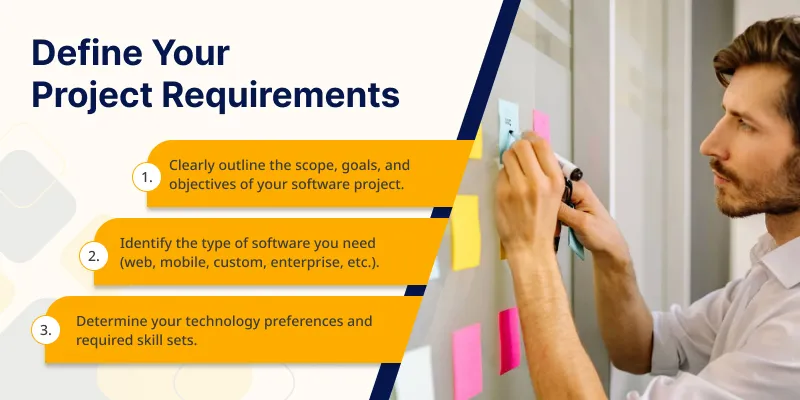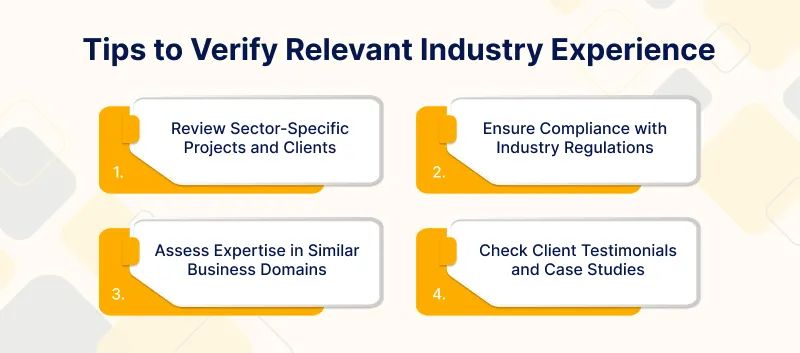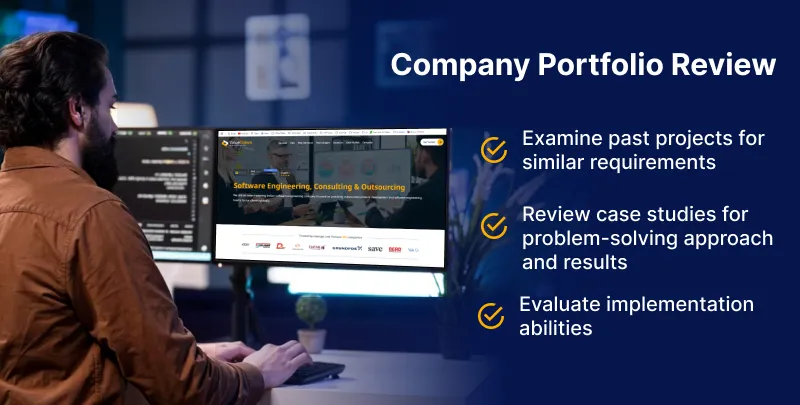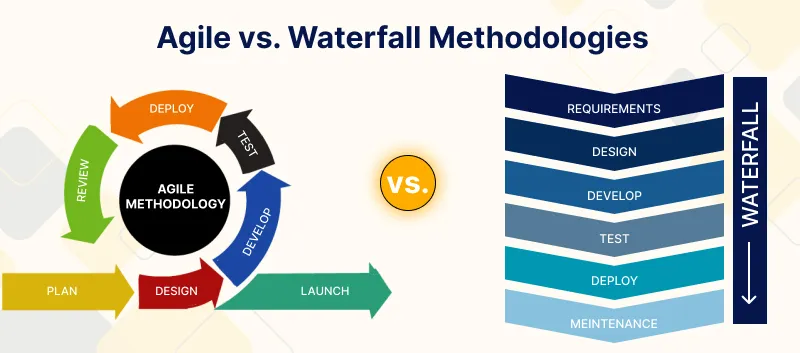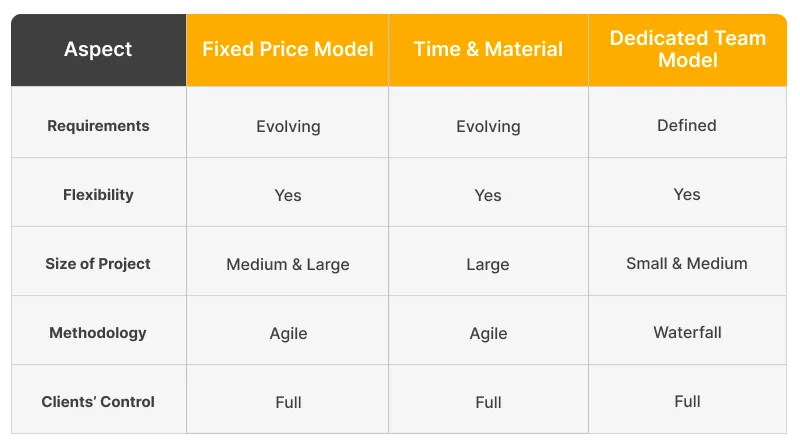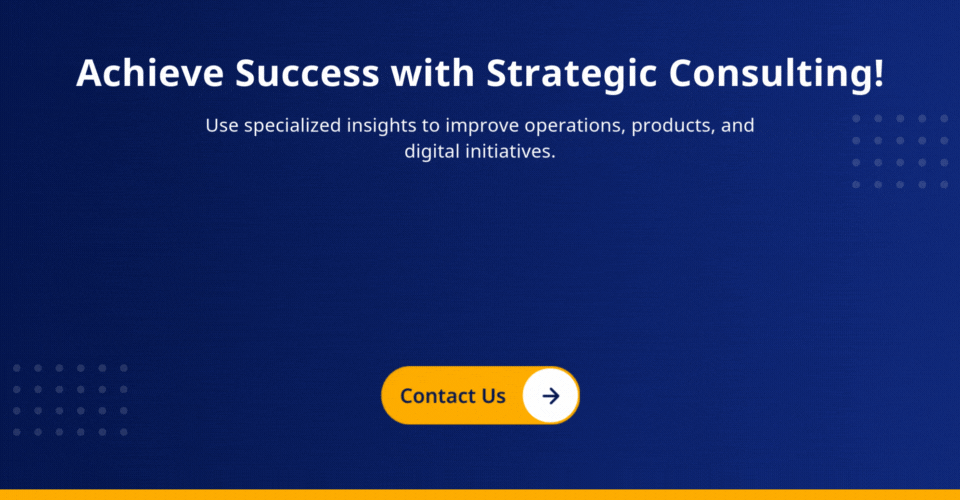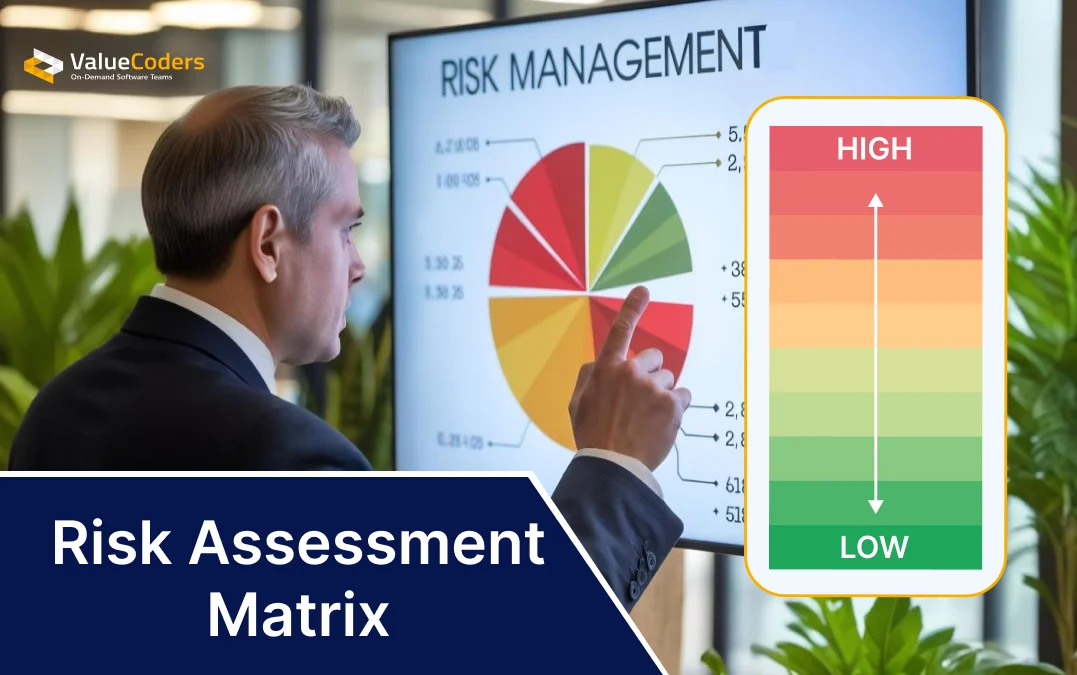According to Statista, the software development market is on a rapid growth path and is expected to reach $702 billion globally by the end of 2024. With an annual growth rate of 5.01% projected from 2024 to 2029, demand for software development services is stronger than ever.
With such high demand, countless software development companies have emerged, making it challenging to decide which one is the best fit. Choosing the right software development company isn’t just about comparing prices or timelines; it’s a decision that requires careful planning and consideration.
So, how to choose the right software development company? This 11-step guide will cover everything you need to know to make a confident choice.
11 Key Steps To Follow While Choosing the Best Software Development Company
Choosing the best software development company is the foremost step in building a successful digitized business. If it isn’t executed carefully, it can affect your business’s long-term success.
Have a look at the key steps involved while selecting software vendors:
Step 1: Define Your Project Requirements
This first step sets the foundation for selecting a company that aligns with your project’s vision.
Clearly outline the scope, goals, and objectives of your software project.
- Ensure your project scope is well-defined, specifying the main goals and long-term objectives.
- Clarify the functionalities and features you need, along with potential user requirements.
We empower your business with tailored software solutions that drive success.
Identify the type of software you need (web, mobile, custom, enterprise, etc.).
- Choose web, mobile, or custom solutions based on your business model and user preferences.
- Assess whether you need enterprise-level applications or tailored solutions for specific business needs.
Determine your technology preferences and required skill sets.
- Decide on technologies like React, .NET, Java, or Python, and ensure the development company has expertise in them.
- Identify the technical capabilities needed, such as UI/UX design, backend development, and cloud integration.
Step 2: Look for Relevant Industry Experience
When selecting a software development company, partnering with one that understands your specific industry is essential. Industry experience matters a lot when choosing the best software development company.
- A company with relevant industry experience will know common issues and regulations specific to your sector.
- Whether handling sensitive healthcare data, ensuring secure financial transactions, or integrating complex supply chains in logistics, their expertise allows them to streamline processes and avoid costly mistakes.
- Ensuring your chosen company has a solid track record in your industry will maximize the likelihood of project success.
Example:
A development company experienced in fintech will know how to comply with financial regulations like PCI DSS. For healthcare, they will be HIPAA compliant. Similarly, in eCommerce, they will be adept at integrating payment gateways and optimizing user experiences for higher conversions.
Also Read: How to Reduce High Software Development Costs for Startups
Step 3: Check Technical Expertise & Technology Stack
This step ensures that the company is technically equipped to meet the specific needs of your software project.
Assess proficiency in the required technology stack (e.g., Java, Python, .NET).
- Review the company’s portfolio to see if they have experience with the specific programming languages and frameworks your project requires.
- Confirm they have certified developers or experts in technologies like Java, Python, .NET, or any specialized tools you need.
Stay updated with the latest technology trends (cloud, AI, IoT).
- Ensure the company keeps up with emerging technologies like cloud computing, AI, IoT, or blockchain to provide innovative and future-proof solutions.
- Their ability to adopt and implement modern technology is crucial for your project’s long-term success and scalability.
Check their ability to deliver scalable, secure, and high-performance solutions.
- Verify if they have delivered scalable solutions that handle growing user demands and data.
- Look for their approach to security and performance optimization to ensure your software remains robust and efficient.
Get projects to market faster with our streamlined development approach.
Step 4: Review the Company Portfolio and Case Studies
Reviewing portfolios and case studies can help you gauge a company’s ability to deliver high-quality results that align with your project goals.
Examine past projects for similar requirements.
- Look at the company’s previous projects to assess their experience with the software you want to develop.
- Ensure they’ve worked on projects with similar functionality, scale, and industry-specific needs, which can give you confidence in their ability to handle your project.
Review case studies for problem-solving approaches and results.
- Case studies provide insights into how the company approaches challenges, overcomes obstacles, and delivers successful outcomes.
- Look for their methodologies, creative problem-solving skills, and the measurable results achieved for clients.
Evaluate implementation abilities.
- Examine whether their solutions are scalable, meaning they can grow with your business or handle increasing user loads.
- Look for innovation in their projects, such as cutting-edge technologies or unique approaches that set their solutions apart from competitors.
- Evaluate their ability to deliver not just a working solution but one that performs well under various conditions (e.g., heavy traffic, security demands).
Step 5: Check Client Testimonials and Reviews
You must look for their client testimonials and reviews before making the final choice for the best software development company:
Use platforms like Clutch and G2 to gather insights.
- Platforms like Clutch, G2, and Google Reviews feature authentic feedback from businesses that have previously worked with the company.
- These reviews allow you to assess the company’s strengths, weaknesses, and overall performance based on real-world experiences.
Importance of positive client relationships and long-term partnerships.
- A company that values long-term collaboration will likely offer ongoing support, flexibility, and dedication beyond project completion.
- Client testimonials reflecting repeat business or partnerships spanning multiple years strongly indicate trustworthiness and client satisfaction.
Look for transparency and consistency in feedback.
- If multiple clients praise the company for transparent communication, meeting deadlines, and delivering high-quality results, it’s a good sign of reliability.
- Conversely, repeated complaints about delays, lack of transparency, or hidden costs should raise red flags. Look for review patterns to identify the company’s core strengths and potential weaknesses.
Also Read: Red Flags in Software Outsourcing: 7 Warning Signs You Can’t Ignore
Step 6: Assess Their Development Methodologies
Assessing a company’s development methodology can help determine whether its process aligns with your project’s flexibility, timelines, and goals.
Compare Agile vs. Waterfall methodologies and their suitability for different projects.
- Agile is ideal for startups and projects requiring flexibility. It allows for iterative development and frequent updates based on user feedback.
- Waterfall works well for more extensive, well-defined projects with strict requirements, typically seen in enterprise-level software development, where each phase must be completed before moving to the next.
Importance of flexible approaches for startups vs. structured approaches.
- Startups often benefit from Agile’s adaptability, which supports quick pivots, frequent testing, and faster time-to-market.
- Enterprises might prefer structured approaches like Waterfall for projects where clarity and strict adherence to timelines and scope are crucial.
Continuous feedback loops enhance product development.
- In methodologies like Agile, continuous feedback from stakeholders and end-users during each iteration leads to improvements, faster problem-solving, and product refinement.
- Frequent testing and updates improve the alignment between the final product and customer needs, ensuring higher success rates.
Step 7: Understand Their Communication and Collaboration Practices
When selecting the best software development company for startups or businesses of any size, you must evaluate the effectiveness of their communication/collaboration practices.
Evaluate the company’s communication channels (Slack, Jira, Trello).
- Ensure that they use reliable communication and project management tools like Slack for real-time messaging, Jira for task tracking, and Trello for project management.
- These platforms help ensure transparency, allowing you to track progress, provide feedback, and stay engaged throughout development.
- For offshore software development services, clear communication is essential to bridge any distance challenges.
Know how often they provide updates on project progress.
- A company that provides frequent updates—whether through weekly meetings, status reports, or task boards.
- It can help you avoid costly delays. Look for a team that values clear and structured communication, informing you about timelines, milestones, and potential roadblocks.
Discuss time zone differences, language proficiency, and cultural fit.
- Language proficiency is another key factor in avoiding miscommunication. Ensure the team can communicate fluently in your preferred language.
- Ensure there’s a cultural fit. This can influence collaboration style, work ethics, and team alignment, creating a smoother working relationship.
- Nearshore software development services typically offer a closer time zone alignment, making real-time communication more feasible.
Get cost-efficient solutions without compromising on quality.
Step 8: Verify the Expertise of Their Development Team
Verifying the development team’s expertise ensures that you are partnering with professionals who can deliver high-quality results and meet your project expectations.
Look for expertise across all roles (developers, UI/UX designers, etc.).
- Ensure the team has a balanced mix of developers proficient in your required technology stack, creative UI/UX designers who understand user-centered design, and QA engineers who can ensure product quality.
- A strong project management team is crucial for ensuring smooth communication, timely delivery, and proper resource management throughout development.
Compare in-house vs. outsourced team structures.
- In-house teams offer better coordination and direct control over the development process. They tend to be more aligned with the company culture and vision.
- Outsourcing software development can be cost-effective but may present challenges in communication, time zone differences, and project control. However, many custom software development companies successfully use outsourced teams with structured management processes.
Assess the technical depth and experience of the team.
- Assess the team’s past work, technical certifications, and experience in handling projects similar to yours.
- Check for a deep understanding of the latest technologies (cloud, AI, IoT) and their ability to build scalable and innovative solutions.
- Experience in troubleshooting complex issues and delivering under tight timelines significantly indicates a team’s capability.
Also Read – Top 8 Healthcare Software Development Companies To Outsource Your Project
Step 9: Budgeting and Pricing Models
Budgeting and choosing the right pricing model ensures you get the best return on investment while avoiding surprises. You must look for this for the software firm selection process.
Compare pricing models (fixed price, time and material, dedicated team).
- Fixed Price is best for well-defined projects with clear scope. It helps you budget accurately but may lack flexibility if changes arise during the project.
- Time and Material: Suitable for projects with evolving requirements. It allows flexibility but requires careful tracking to avoid overspending.
- Dedicated Team: This model is ideal for long-term or complex projects. You pay for a dedicated team working exclusively on your project, but it can be more expensive over time.
Avoid the cheapest options—balance cost-effectiveness with quality.
- While it’s tempting to choose the cheapest option, this often results in poor quality or hidden costs later.
- Prioritize value over price by assessing both the quality of work and the team’s experience.
Clarify the scope to avoid hidden fees or unexpected expenses.
- Clearly define the project scope, deliverables, and timelines in the contract. Be transparent about any potential changes in requirements or additions to avoid unexpected costs.
- Ask for a breakdown of the pricing structure to understand what you’re paying for, ensuring no hidden charges or ambiguous terms exist.
Also Read: Overcoming Challenges in Custom Software Development: Effective Strategies and Best Practices
Step 10: Consider Post-Development Support and Maintenance
Software development best practices should be followed in this step. You must check if the company provides post-development support and maintenance in their software development and engineering services while selecting the best software development company:
Discuss the need for ongoing support, updates, and bug fixing..
- Ensure the development company offers post-launch services like bug fixing, performance monitoring, and regular updates.
- Minor technical issues could snowball into major problems without proper support, affecting your user experience and business operations.
Understand the importance of clear SLAs (Service Level Agreements).
- This agreement should outline response times, the level of support (e.g., 24/7 availability), and the timeframe for resolving issues.
- A well-defined SLA ensures the company is committed to timely support when issues arise.
Inquire about future software upgrades and improvements.
- Discuss their approach to scaling the software, adding functionalities, and adapting to new technologies or market trends.
- A flexible and proactive development team can help your software stay relevant and competitive in the long run.
Step 11: Consider the Company Culture and Work Ethic
Choosing a company whose culture and work ethic align with yours can lead to a more productive partnership, as well as software vendor assessment and a software solution that exceeds expectations.
Align with a company that shares your vision and values.
- Choose a software development company that understands your goals and values. This will foster better collaboration and ensure the project aligns with your long-term vision.
- Look for companies committed to your industry, project type, and business values.
Assess their dedication, work ethic, and approach to collaboration.
- Observe the company’s level of engagement and enthusiasm in initial discussions. A dedicated team will go beyond just delivering a project—they’ll aim to add value and contribute to your success.
- Ask about their teamwork, communication, and problem-solving approach to ensure smooth collaboration throughout the project.
Look for a team passionate about solving problems, not just completing tasks.
- A team passionate about innovation will actively seek ways to overcome obstacles and suggest improvements, ensuring the best possible outcome for your software.
- The company should prioritize delivering a solution tailored to your needs, not just ticking off tasks.
Learn critical evaluation points and discover the top factors for long-term success.
Why ValueCoders Is Your Best Software Development Partner?
With 20+ years of experience, ValueCoders is one of the best software development companies with a global footprint. We offer custom software development, web and mobile app development, and IT consulting services.
- Our team of 475+ software professionals specializes in .NET, Java, PHP, Python, AI, and blockchain.
- We prioritize a client-first approach with cost-effective solutions, dedicated teams, and clear communication.
- Rated highly on Clutch and GoodFirms, we are recognized as an Okta and AWS partner.
- Our key clients include Spinny, Eatigo, Panasonic, Yale, CSF, and others in various industries.
- Partnerships with MongoDB and Deloitte enhance our capabilities and our research is widely published.
Our impressive numbers showcase our success, but it’s our work that truly speaks volumes. Have a look at the successful implementations by our software experts provided below:
1. Reporting Tool
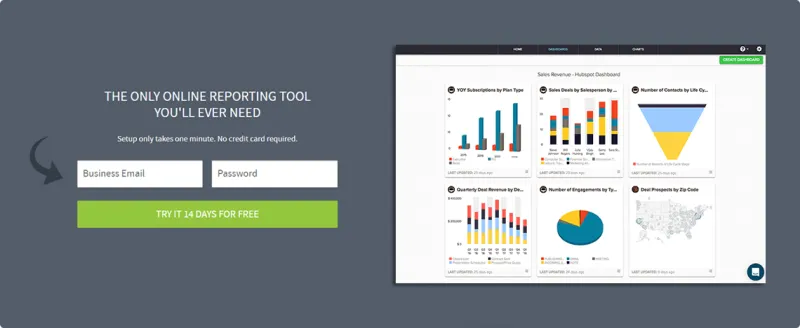
2. Asset Management
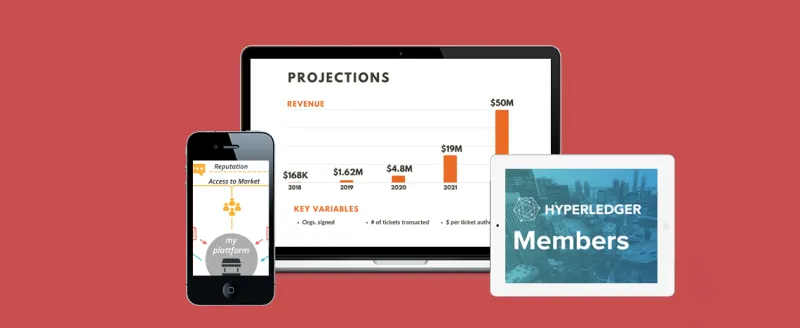
Conclusion
Selecting the right software development company is critical for achieving project success and driving long-term business growth. You’ll find a reliable software development company if you follow these structured steps carefully:
- Do a deep research
- Review client testimonials
- Evaluating tech partners
- Explore case studies
- Check the company’s portfolio
- Evaluate the company’s culture
With a structured approach, you can secure a long-term partnership with a reliable software development team. If you’re looking for a trusted development company, particularly among the top development companies in India, contact us to turn your business vision into reality.


